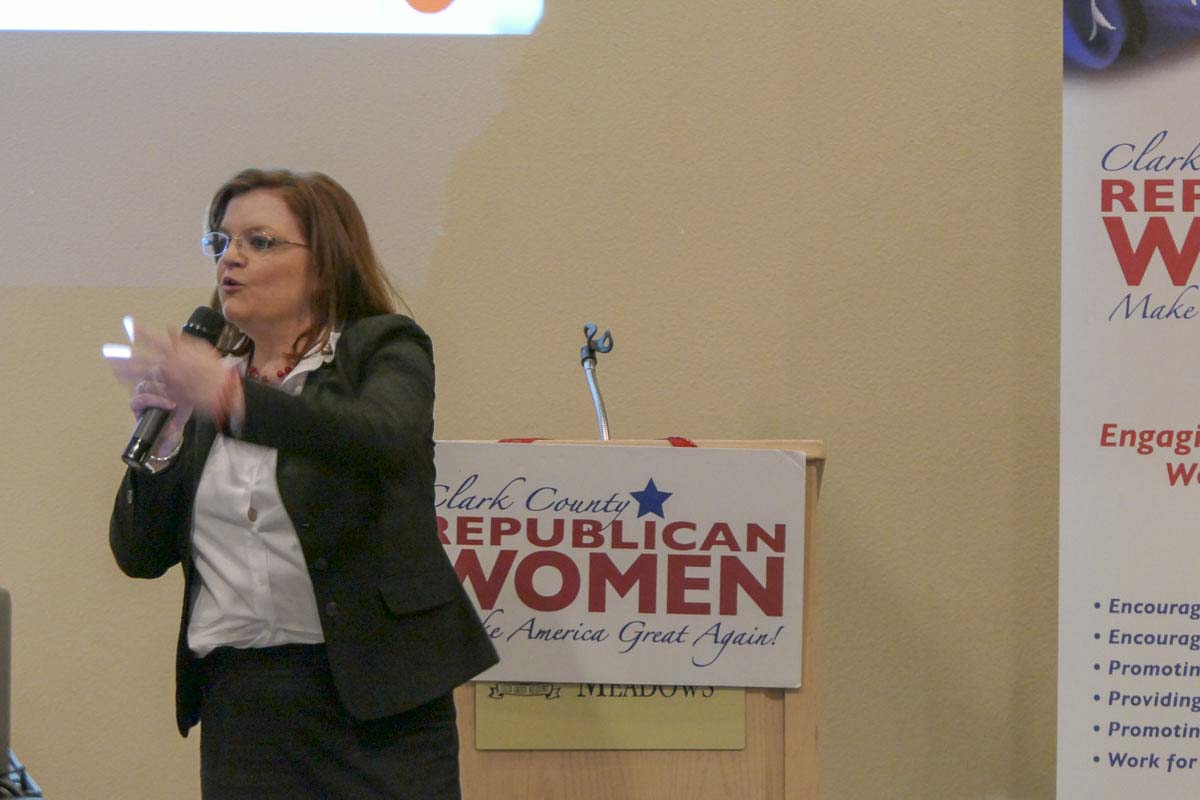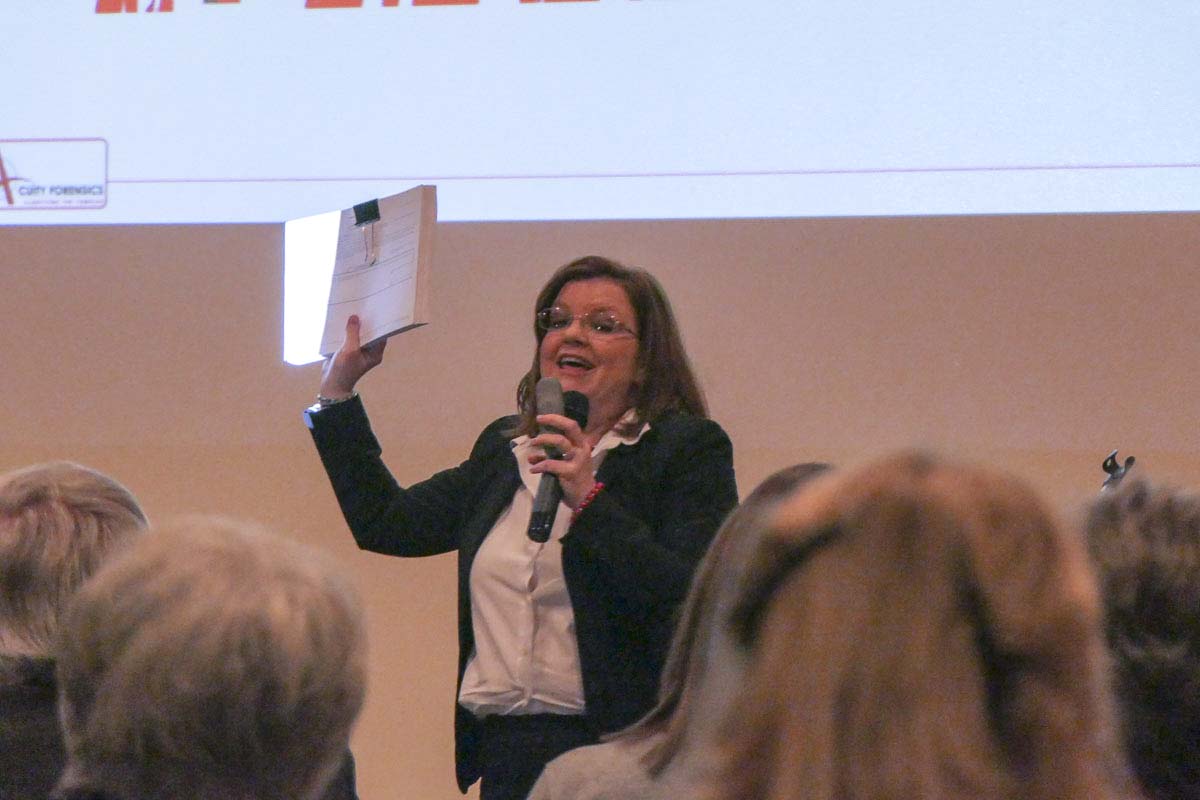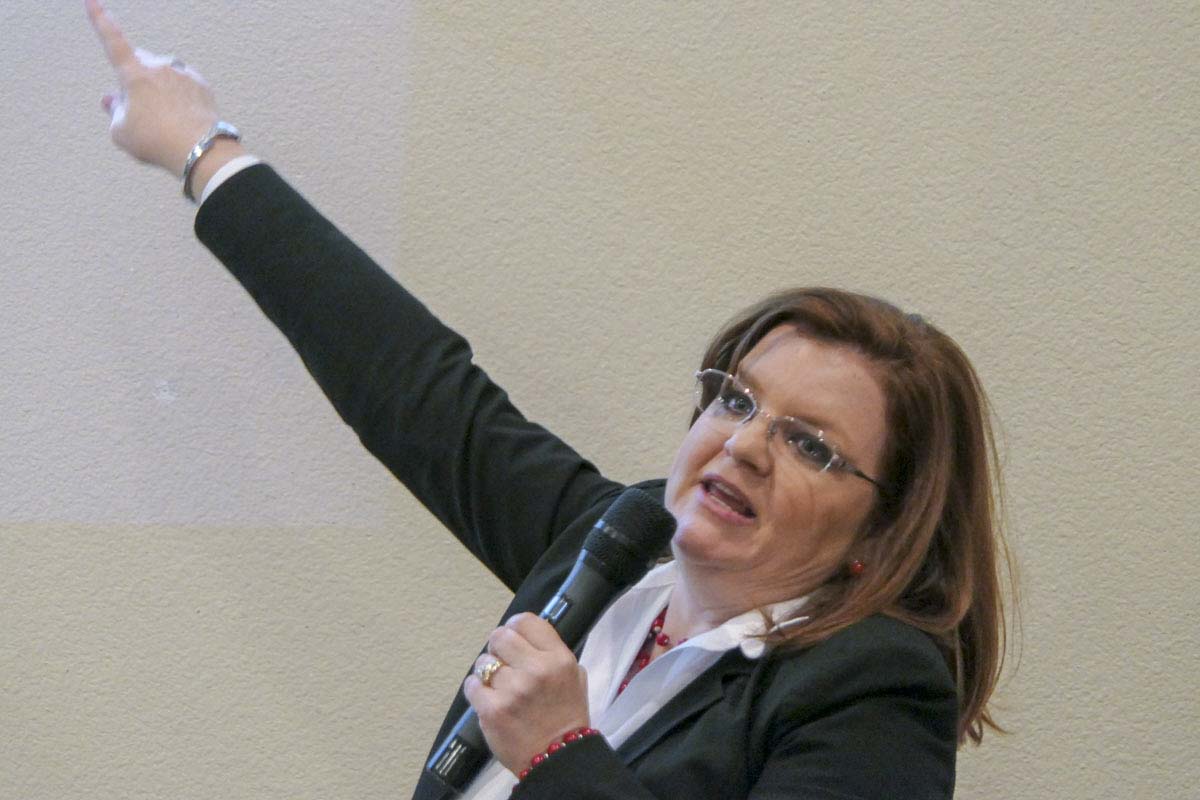Tiffany Couch talked about the McCleary fallout at a Clark County Republican Women dinner meeting this week
VANCOUVER — Tiffany Couch was scheduled to speak at this month’s meeting of Clark County Republican Women long before the recent unrest that nearly led to yet another school cancelling strike for Vancouver Public Schools. But the timing was rather fortuitous.
That’s because Couch is the CEO and founder of Acuity Forensics in Vancouver. Couch has spent years as an auditor working primarily with school districts, and she was at Thursday’s event to talk about what she’d found out from a deep dive into what area districts are facing in the wake of the legislature’s McCleary Funding decision, and the teacher strikes that ended in massive pay increases this past Summer.

Couch became a well-known figure, especially during Battle Ground’s protracted labor dispute and school strike, as she used her accounting expertise to dig deep into the numbers.
“I was not paid by anybody,” Couch told the audience inside the meeting room at Club Green Meadows. “I was working a ridiculous amount of hours last year, and I had no time for this. I had a husband at three in the morning say ‘babe, you probably should think about coming to bed because you’ve got to go to work tomorrow.'”
Couch has spent the time since those strikes ended trying to understand what led to what, she believes, is unsustainable spending on the part of many districts. While the slides Couch presented contained many columns of numbers, she says the main takeaway is simple: “These school districts can’t afford the raises they gave. They can’t afford them.”
Much of her hour-long presentation focused on Vancouver, which is the only local district so far to outline some of the budget issues they’re facing. Already, the district has outlined an expected $11.44 million budget deficit for the 2019-2020 school year, and plans to cut expenses and reduce staff to address the situation. That was before Friday’s tentative deal with their certified union, which has not yet been detailed publicly. The district had said that the union’s proposal would mean an additional $500,000 hit against their budget.
“There’s really only two options, right? I have to figure out a way to get more money in, or I have to reduce what I spend,” Couch says of the conundrum facing many schools in the coming years. “Or a combination of both.”
Myths and misnomers
Couch set out, in her presentation, to address some of the primary allegations thrown about on social media during the teacher strikes. The first was that district superintendents make far too much money.
In graph form, Couch demonstrated that even the $335,000 salary of Vancouver Superintendent Steve Webb amounts to only 0.089 percent of the district’s $375 million budget.
“I’m making no professional opinions on these salaries,” Couch says, “I’m just pointing out yeah, it’s a lot of money, but what are the things that this person has responsibility for? Budgets, people, all of the political ramifications, all of those things that go into the salary.”

Given the decisions superintendents across the state may be forced to make in the next couple of years, Couch argues they may be more worth their salaries than ever. She also points out that a search of salaries for many of the top officials within the Washington Education Association (WEA), the state union representing teachers, rivals that of many top paid superintendents.
“And yet they were the same ones telling the teachers ‘how dare the superintendents get paid this,’” Couch says.
She adds that it’s also important to remember that superintendents aren’t the ones who decide what they get paid. That’s up to an elected school board, and based on market factors more than pure greed.
The other major “myth” that Couch wanted to address was the oft-repeated line about district “slush funds.”
In Vancouver Public Schools, for instance, Couch says the district does have $31.5 million in their total fund balance. But only a little over $8 million is “unassigned.” The rest is either money set aside for future anticipated expenses, such as a salary increases, curriculum, or equipment, or else restricted by state law.
“We have a real problem in our society where people are living paycheck to paycheck,” says Couch, noting that her professional career has made that point abundantly clear. “And some of it is totally necessary, I understand that, especially during certain points of life. But we’ve also got a lot of people who really, really, really want to have a certain lifestyle, or get themselves into an inordinate amount of debt. So they don’t understand the concept of a rainy day fund.”
Couch says some also seem to have forgotten the Great Recession years when districts were dipping into those rainy day funds to make ends meet, “because none of us were making money to put money into the coffers.”
Vancouver Public Schools has already announced plans to use around $2.75 million of its rainy day fund to make up part of the expected budget shortfall in the 2019-2020 budget.
The third thing Couch called a myth was the sense that districts weren’t spending all of the money sent by the legislature toward teacher salaries. In that case, she blames WEA for spreading misinformation.
“My son got into a little thing this weekend and he said ‘I wasn’t lying. I wasn’t being forthcoming,’” Couch quipped. “So I’m just going to use that. The unions weren’t being forthcoming about the loss of the local levy dollars. They just weren’t. And this drove me insane because I thought, ‘well wait a minute. They have to know!'”
Using another list of budget data, Couch says unions focused on an influx of new state money districts were receiving over the next two years. But, in so doing, they glossed over local levy funding that was drying up as new caps went into effect starting this year.
“That additional money that comes in this fiscal year? That doesn’t continue in perpetuity,” said Couch, noting that her research shows Vancouver could face shortfalls of $11 million or more over the next several years.
“It’s kind of like, you know you have a house and you have some money in savings so you can afford the down payment,” she said, “but you can’t afford the payments going forward, right?”
Couch says an interesting aspect of the debate at the end of last Summer was whether or not teachers had actually seen a salary increase in recent years. She said she visited several picket lines, and talked to teachers about that, pointing out they had received scheduled step increases, and usually got a Cost of Living Adjustment (COLA) as well.
“That’s not a raise,” is the response she says she heard repeatedly. At least one member of the audience piped up and said he’d heard similar comments from educators in Camas, where a deal was reached before a strike took place.
“I don’t know about you but when I give my employees a cost of living raise, they’re pretty happy,” said Couch. “They call that a raise in my office.”
But that point of view, Couch says, and the seeming inability of many districts to properly explain where their money was coming from, and where it was going, led to much of the unrest. She says at one point a district official asked why she was able to explain the situation so much better than they could.
“’I don’t know,’” she responded, “‘but if you explained it a little bit better we might not be having all these issues.'”
Where do we go from here?
Couch says she has gotten the sense that many districts caved to the demands of teachers, despite knowing the financial situation it would put them in sooner rather than later.
“Based on my understanding of these numbers, and talking to various school officials, they figured that windfall would help carry the day,” she says, referring to the McCleary money, “they wouldn’t have to dip too far into those rainy day reserves, or those spendable reserves, and in the next few years a McCleary fix could happen.”

As for what that “McCleary Fix” might look like is anyone’s guess. Already legislators in Olympia have tossed around ideas like adjusting or even eliminating some local levy caps, re-implementing a state salary schedule, or taking a closer look at the regionalization formula that determines how much a district gets for its teachers.
But almost every single one of those potential changes is likely to cost more, as the state moves on to other expensive projects like mental health treatment, public healthcare options, and massive transportation packages.
“If I’ve gone over my savings, now I have to go find another savings account, basically, or go into debt,” says Couch. Unlike the Federal government, local entities, including school districts, cannot operate at a deficit. Either more money will need to be put in, or else budgets will need to be cut. That’s going to happen by either reducing staff, cutting programs, or a combination of those things.
Couch wrapped up her remarks with one more storm cloud that few people are talking about. Districts across the state carry what is known as “unfunded liabilities” in the form of the Public Employee Retirement System, otherwise known as PERS. Similar to Oregon, the system in Washington is spending more money than it is bringing in. Districts don’t generally show pension debt on their budgets. And the recent increase to wages for most staff means those unfunded liabilities are only growing.
“The higher the salary, the more money has to go into the retirement system,” Couch says, “and they’re not funding that because they don’t have the cash to fund it fully.”
Couch has recently authored a book entitled “The Thief in Your Company,” which focuses on corporate fraud, its fallout, and how to recognize and stop it. You can read more about her at www.acuityforensics.com.




